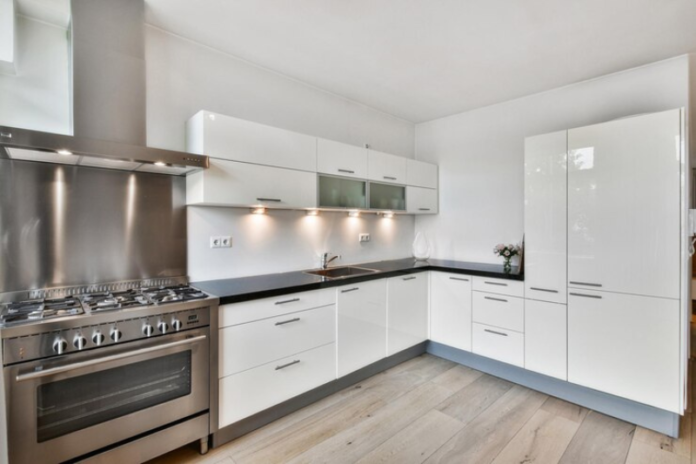Open-concept kitchens have lately become somewhat common in modern houses. They provide a smooth flow for family time and entertainment, therefore tying your kitchen to the rest of your house. Open kitchens might, however, cause storage issues. Fewer barriers mean you have to find inventive ways to keep everything orderly. This is where wise kitchen cabinet designs decisions help, particularly when optimizing available space.
Emphasizing maximum utility without compromising appearance, this blog investigates space-saving cabinet solutions specifically for open kitchens. By the end, you will realize how much maintaining your open kitchen neat and functioning depends on the appropriate custom-made kitchen cabinet designs.
Floor-to-Ceiling Cabinets: Maximize Vertical Space
Using floor-to-ceiling cabinets is one of the best strategies to maximize storage in an open kitchen. Usually neglected, vertical space is used in this design. Tall cabinets give extra space for seasonal cookware or unique dinnerware—things you seldom use every day. Floor-to-ceiling cabinets also keep things orderly and out of sight while giving the kitchen a clean, modern appeal.
Pull-Out Cabinets for Easy Access
In an open kitchen, pull-out cabinets may literally save lives. These cabinets swing out to expose storage, therefore enabling you to fully use their depth. Pull-outs are great for grouping commodities such as cleaning supplies, canned foods, or spices. They make everything easily available at a glance, unlike conventional cabinets, which let everything disappear to the rear.
Pull-out cabinets assist to keep counters free, which is particularly crucial in open-concept areas where clutter is more obvious.
Corner Cabinets: Smart Solutions for Tricky Spots
Any kitchen might have trouble with corner cabinets, but in an open-concept layout, they are particularly crucial for maximizing every square inch of space. Pull-out trays or lazy susans inside corner cabinets may make these difficult spaces more useful. These ideas let you keep pots, pans, and small appliances in places you would not otherwise be able to reach.
These creative kitchen cabinet design techniques help to transform wasted space into productive storage by orienting corner cabinets. You have simple access to products, so less storage elsewhere is needed, and the open sense of the kitchen is maintained.
Floating Shelves for a Light Look
Floating shelves give storage without bulky cabinets and a light, open design. For daily objects like glasses or plates, which must be within reach, they perform nicely for storage. Although they don’t conceal clutter, they might be the perfect fit for things you use regularly and find aesthetically pleasing.
Floating shelves strike a compromise between storage and design, even if they have less than conventional cabinets. They maintain the open kitchen’s airy and practical layout while ensuring that key objects are within reach.
Under-Island Cabinets for Hidden Storage
If an island in your open kitchen calls for cabinetry beneath, think about it. This sometimes disregarded space stores things you might not need every day. Under the island, you may save room elsewhere by storing items such as big pots, serving dishes, or even small appliances.
One great option for maintaining goods accessible but hidden is under-island cabinets. Furthermore, they may assist in clear worktops, which is particularly crucial in open areas where the kitchen has a clear view from the living room. Keeping objects hidden helps you to preserve the open and clean impression of your kitchen.
Endnotes
Storage in an open-concept kitchen must be covert as well as practical. Smart kitchen cabinet designs techniques help you to maintain a clean kitchen without sacrificing its open, airy atmosphere. These storage ideas can help you maximize your current space, whether your remodeling project calls for it or just makes sense. Careful decisions allow a custom-made kitchen cabinet designs to provide all the storage you want without sacrificing elegance.
Disclaimer: The information provided in this guide is for informational purposes only and does not constitute legal or financial advice
For Media Enquiries/Guest Posting/Press Release – Write for us


